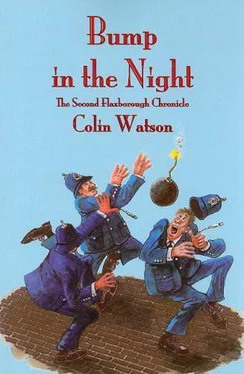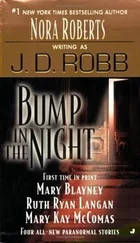“Certainly I should. I’ve no doubt in my own mind that that is what he was doing.”
Again, at the instance of Larch, there was a shifting of places. The coroner found beside him a fat, sleek man in a brown suit. Mr Herbert Smiles wore that expression, half nervous, half challenging, of one who has made a lot of money just a shade too quickly. When he answered Mr Chalice’s questions he spoke with throaty solemnity. One of the best, his tone proclaimed, had passed on, and you never knew but what you might be next yourself.
Had Mr Biggadyke been in the custom of visiting the Trade and Haulage Club at Flaxborough? Yes, he was a member and at one time had regularly spent an evening there each week.
And afterwards had he availed himself of Mr Smiles’s hospitality until the following morning? He had, and very welcome had he been.
When had the custom lapsed? Oh, quite a while since—four months or more. They had met, yes, and had a few drinks from time to time. On good terms? Excellent terms, excellent. Yes.
“But in recent weeks, Mr Smiles, you are quite sure that Mr Biggadyke did not stay overnight at your house on Tuesday?”
“Not for several months, he hasn’t. I’ll be perfectly honest, mind—I did promise him I’d say that’s where he’d been if anybody asked. But now the poor chap’s passed on, well, I can only tell the truth.”
“As you swore to do,” the coroner dryly reminded him, nodding at the testament between them.
“Yes. As you say...of course.” Mr Smiles regarded the little black book as apprehensively as if it had borne the imprint of the Commissioners of Inland Revenue.
The last witness was Sergeant Worple.
He presented, with a wealth of technical detail that Mr Chalice let pass without recording, an account of the demolition of the Courtney-Snell memorial, the beheading of Alderman Berry’s statue, and the destruction of the great eye of Mr Hoole. No one, he observed, had been apprehended for the commission of these felonies (or crimes), which, at the time of the death of Mr Stanley Biggadyke were still officially ascribed to a person or persons unknown.
On the night of July the first, Sergeant Worple continued, a call was received at Fen Street police station from an officer of Chalmsbury Fire Brigade who reported the finding of a body near a burnt-out caravan at the rear of the premises of the Chalmsbury Carriage Company. He went to the scene that night and again the following morning. On the second occasion he was accompanied by Chief Inspector Larch and Constable Wraby.
Extensive inquiries were made and the site of the occurrence carefully examined.
The examination, though yielding clear indication that the caravan had been destroyed by an explosion and subsequent fire, provided no clues as to the cause of the explosion.
Inquiries also drew negative results apart from mutually corroborative statements by night drivers and fitters at the depot that the explosion occurred at 11.50 p.m. and was of considerable violence.
“These men knew, did they, that their employer had left the premises to go to his caravan?”
“Yes, sir. He arrived in his car at about 11.35 and told one of the mechanics to put the car in the garage. Then he walked down the yard to the fence and let himself through the gate into the field.”
“Were you able to learn, sergeant, whether anyone other than Mr Biggadyke had access to his caravan?”
“I did ask that question of several of the staff, sir, and they all said he was the only person who ever used it. He kept it locked and no one else at the firm had a key to it—or a key to the gate in the back fence, for that matter.”
“Did any of Mr Biggadyke’s employees know for what purpose he used the caravan?”
“They had no certain knowledge, sir. One or two offered guesses but I did not encourage what seemed to me to be rather improper speculation.”
The coroner glanced up at Worple, who was looking virtuous. “And that is all, is it, sergeant, that you can tell us? Nothing else occurs to you?”
Worple stared at Mr Chalice’s pen for a few seconds then said suddenly and decisively: “No, sir.”
The coroner leaned back, half turning, and addressed Larch. “Is there any question you would care to put, Chief Inspector?”
“I believe the witnesses have covered all the points that I can think of, sir.”
Mr Chalice nodded and faced the table once more. Although he was sitting without a jury, he did not believe in recording a verdict without giving his reasons. He drew the grey hair tangles down over his bright, shrewd eyes and began to speak.
“As the last witness so properly remarked”—Worple’s chin tightened with gratification—“guessing should not enter into an inquiry of this nature. Unfortunately, however, the evidence available to us is mainly of the kind that in a court of law would be called circumstantial. And forming conclusions from circumstantial evidence is a matter of putting two and two together: it is in some degree a speculative process. What we must guard against, of course, is making the answer more than four.
“Now, to start with, I am going to exclude the possibility that the four explosions of which we have heard today might have been unconnected incidents. The evidence leaves no doubt in my mind that the first three were contrived by one and the same person. What purpose that person entertained I cannot imagine, but some gesture or other would appear to have been intended.
“The fourth explosion did not follow the pattern established by the earlier ones. For one thing, it seems to have been the most violent of all. It was not staged in a public place, nor was it directed against a monument or symbol. An exhibitionist motive is not discernible.
“Moreover, it cost a human life.
“I conclude from these points of difference that the fourth explosion occurred spontaneously and accidentally.
“That brings us to its victim, Mr Stanley Biggadyke.
“It was his caravan in which the explosive substance lay—unless, of course, he had taken it with him when he left his car that night. In any case, he alone had access to the caravan, so we must presume that he was responsible for the explosive being there.
“That presumption is strengthened to virtual certainty when we take into consideration this fact. On all the nights when the first three explosions were engineered Mr Biggadyke had deliberately given a false account of his whereabouts and had even arranged for his story to be borne out by his friend, Mr Smiles, who today very rightly repudiated it.
“It is no part of my duty to accuse the deceased of activities for which he might have been called to account in a court of justice. But in so far as those activities provide the only explanation of his death that seems tenable, I must express my view that Mr Biggadyke was the person responsible for the explosions on the third, seventeenth and twenty-fourth of June, and that he unintentionally caused the one which killed him in his caravan a week later.
“My verdict, accordingly, is death by misadventure.”
“And no one,” the man from the Daily Sun murmured to Mr Kebble, “could say fairer nor that.”
Chapter Twelve
Mr Kebble could not remember when last a policeman had bought him a drink. It was therefore with a feeling of pleasurable awe that he accepted the brandy that Inspector Purbright brought to their table in the Nelson and Emma.
“So it’s all over, old chap,” said Kebble, having plunged his brandy into a half tankard of water and pledged the inspector’s health.
“It looks rather like it.”
“You’ll be going back now, I suppose. I’m sorry.”
“That’s nice of you, Mr Kebble. Actually, though, I shall probably hang on for a few more days. Chalmsbury’s quite an attractive little town.”
Читать дальше












